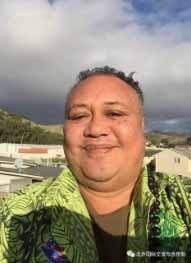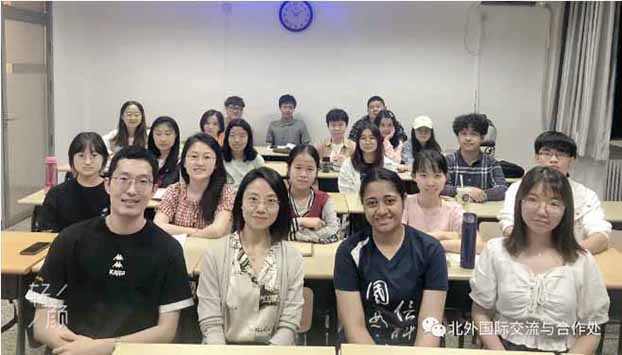By Setope So’oaemalelagi

(Chinese name: Bruce Lee) is a Samoan lecturer, research assistant and columnist at the School of International Studies : Beijing Foreign Studies University. Proficient in Samoan and English. His main research fields are – Pacific Island culture, the study of the bilateral relationship and ‘Belt and Road Initiative between Samoa and China, and the study of Samoan language, history and politics. He holds a Bachelor of Arts Political Science with Honours – University of Victoria New Zealand and is attached to the National University of Samoa (NUS) – English lecturer from 2016 to 2019.


This article is written as a celebratory congratulations and best wishes to Beijing Foreign Studies University on her 80th Anniversary on behalf of the National University of Samoa (NUS) and the people of the greater South Pacific.
The article touches on the significance of the Samoan Language Elementary and South Pacific Society Courses launched on March 1 2020 – and how it adds another ‘thread’ to the fabric of knowledge found at China’s most prestigious learning institution for foreign cultures and language …
“Ia manuia le aso e fa’ailoa ai le valusefulu o tausaga mo le Universite o Gagana Eseese ma le Va ma Atunu’u i Fafo i Beijing Seina” (Happy Anniversary BFSU)
On March 1 2020 – the very first utterances of Samoan language were delivered to a small group of BFSU students nervously huddled around computers at 7.30pm Beijing standard time – the event marked a historic first for China and South Pacific Scholarship – the very first Polynesian language – Samoan – to be formally taught at a Chinese University in the history of Chinese academia.
When we consider the implications of such an event, it is important to place the small number of students (6) in the extraordinary context of a pandemic sweeping the world and the sacrifices that their families and loved ones have had to endure just to create a safe environment and conduit to attend China’s most preeminent University for studying foreign languages and cultures. It’s no accident that BFSU carries the moniker – “The cradle of diplomacy” conversely Samoa is often referred to as the “cradle of the Pacific”.
A slew of key questions arises – whenever students, teachers and families analyse courses to study – “Why?” – why study a language and a culture practiced and embodied by 600,000 people in the world – 200,000 of whom are in Samoa proper – and the remainder a diaspora in New Zealand, Australia, United States and even China? Why is there a need to spend time studying a subject which perhaps may not be of use when formulating an algorithm or peering through the lens of a microscope? At first answers are elusive and mystifying but once students fully engage in either Samoan Elementary Language Course 101 or South Pacific Society and Culture then they begin to realize that the South Pacific offers a dimension of scholarship commonly unseen – unheard – or even under appreciated. However, as this course is running in its second year – 95% of students are Chinese and 5% comprises international students from as far afield as South Korea, Mongolia, Myanmar, Indonesia, Benign, Chad Sub-Sahara Africa – The Democratic Republic of Congo and Malaysia. And for every student -the significance of taking up these courses in Samoan can best be described this way “they are the first of their nations to speak or learn Samoan language and culture”- or as a famous ancient quote goes “the more we know the more we don’t know” (Aristotle).
The South Pacific Ocean and its Island nations make up 30% of the earth’s surface and is home to 25,000 Islands! (so far discovered and named) It is also the most diverse place on earth based on race, languages and eco-systems. China over the last 20 years has committed enormous resources to developing diplomatic and economic ties through its Belt and Road Initiative in the South Pacific particularly through education – the Confucius Institute Centers and cultural exchanges are examples – hence you can imagine the possibilities for young aspiring students specializing in education International Relations – Linguistics – Anthropology – Civil Administration – postgraduate research and the like. The question of “why” shifts to “why not?”
This article is binary in nature and by binary, I mean that two fundamental elements in my humble opinion have made this program a success and the first is the ‘team’ and second – ‘students’ both of whom invokes an old Samoan fisherman’s proverb:
“Aua e te manumanu i le i’a ae galo le upega.”
Loosely translated – “Keep your eyes on the net and not only the fish” At the outset of March 2020 student numbers for both Samoan Language and South Pacific Society and Culture – combined was 12 and by September 2021 numbers reached a peak of 45! The courses popularity and especially its relevance has grown exponentially even if students had the faintest idea that Samoa was actually a country and that Pacific people and the ocean are practically married and that yes indeed – there is such a thing as ‘flying fish’. In a recent class I happened to mention ‘flying fish’ and a student quipped incredulously – “Cmon Sir – flying fish – seriously?” So in an instant I flicked on a short clip of famous naturalist Sir David Attenborough’s ‘Our Planet’ – and on screen in full flight was a school of flying fish – way above the pacific waves in brilliant colour… it’s moments like these as you witness the intense wonder and bewilderment of students that teaching at BFSU is sheer joy.
So what makes a good team? Well it begins with our team leader – Coordinator of the South Pacific Studies Center- Lecturer Zhou Dujuan – an expert in Polynesian syntax and grammar and a sociologist with a stint at Manoa University Hawaii (2017-2018) where she completed Pacific Development courses with Prof. John Mayer, an authority in Pacific studies. Ms. Zhou exudes calm, eloquence and professionalism and is firm on maintaining very high standards for the course – she has tremendous skills from helping staff with technical issues to managing staff and students at all levels. Every class has a co-teacher to fix technical issues and act as an aide to myself working at this point from New Zealand. This ancillary role is performed by Mr. Luo Tianyi a post-graduate student in Samoan language from Auckland University New Zealand. And finally the School of English and International Studies (SEIS) which provides the protective layer for all manner of administration – Ms. Wang Zhuoning, the Administrator for International Affairs and Ms. Wang Hongying, the Administrator for Undergraduate Teaching Affairs. Although the Pacific Course started in March 2020 – the actual planning and design of the course goes back many years and has involved a matrix of other Pacific Research Centers in Shanghai, Xi’an, Guangzhou and Liaocheng University in Shandong Province. So yes, the team and now the students? What makes a good student?
Every student who has come through this course carries with them the notion and responsibility that they are the very first group to undertake a learning curve premised on two interesting concepts Pacific language – and culture. Now they understand a language and culture far removed from their own and more importantly developed skills in research, writing and analysis – inspired by their own ‘curiosity’. Similarly, two questions about learning have baffled philosophers – educators past and present – from Confucius to Plato, Aristotle, Noam Chomsky, Descartes to Li Bai – “what is education?” and “who is it for?” To begin with a teacher couldn’t even think about these questions if not for students’ behaviour and curiosity – BFSU students in all my classes and of all nationalities are polite, intriguing, passionate and competitive. The common denominator when analysing key performance indicators is that many students are not fazed and are quite open minded when faced with new cultural phenomena such as ‘tattooing’, ‘burial rituals’, ceremonial drink like ‘kava’ and primitive societies untouched by the forces of modernization. Nonetheless I can confirm that BFSU is perhaps the best University in China for foreign language and cultural studies – and that students and academic staff are also equal to the task.
